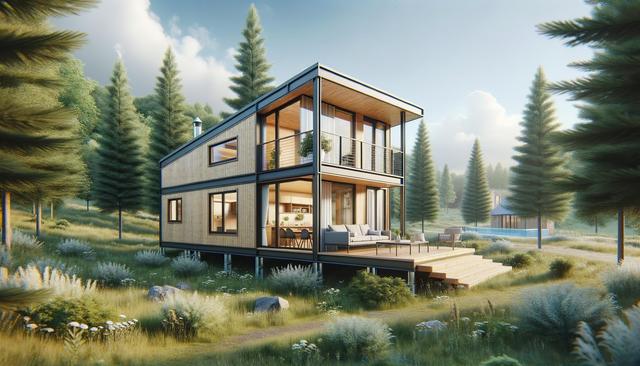
Modular Homes: A Room-by-Room Guide to Efficient Living Spaces
Understanding Modular Home Design
Modular homes offer a unique blend of flexibility and sustainability, making them an attractive option for modern living. These homes are constructed in sections, or modules, within a controlled factory environment, and are then transported to the site for assembly. This method not only minimizes construction waste but also significantly reduces build time. A key feature of modular homes is their adaptability; homeowners can choose from a variety of room layouts, such as 1, 2, 3, or 4-room configurations, to meet their specific needs. This versatility ensures that modular homes can cater to singles, couples, families, and even multigenerational households. Furthermore, the factory-setting construction allows for high-quality control, enhancing the overall durability and energy efficiency of these homes.
Customizing Your Modular Space
One of the most appealing aspects of modular homes is the ability to customize your living space. Homeowners are not restricted to a standard blueprint; instead, they can tailor their modular home to reflect their personal style and requirements. Whether it’s adding a spacious kitchen, a cozy reading nook, or an extra bathroom, the customization possibilities are almost endless. Additionally, modular homes offer a range of finishes and materials, allowing for a personalized touch without compromising on quality. The ease of customization ensures that each home is unique, catering to diverse lifestyles and preferences. For those who value eco-friendliness, sustainable materials and energy-efficient systems can also be integrated seamlessly into the design, further reducing the environmental impact and utility costs.
Efficient Use of Space
Modular homes are designed with efficiency in mind, making optimal use of the available space. This is especially important for those living in urban areas where space is at a premium. The intelligent layout of these homes ensures that every square foot is functional, eliminating wasted space. For example, a typical 2-room modular home can include a multifunctional living area that serves as both a lounge and dining space, with hidden storage solutions to keep the area clutter-free. Some designs even incorporate modular furniture that can be rearranged or reconfigured as needed. This efficiency not only enhances the living experience but also contributes to a minimalist lifestyle, which is becoming increasingly popular among city dwellers.
Quality and Durability
The quality of modular homes is often superior to traditional site-built homes due to the stringent quality control measures in place during the manufacturing process. Each module is crafted with precision and undergoes rigorous inspections to ensure it meets high standards. The controlled factory environment protects building materials from weather-related damage, leading to fewer defects and longer-lasting homes. Additionally, the robust construction methods employed in modular home manufacturing contribute to their durability and resilience, particularly in regions prone to harsh weather conditions. Homeowners can expect their modular home to maintain its structural integrity and aesthetic appeal for many years, offering a wise investment for the future.
Economic and Environmental Benefits
Modular homes present significant economic and environmental advantages. Economically, they are often more cost-effective than traditional homes due to the reduced construction time and labor costs. The ability to customize without the need for extensive renovations further saves money. Environmentally, modular homes are designed to be energy-efficient, employing features such as insulation, energy-efficient windows, and heating systems that reduce energy consumption. This not only lowers utility bills but also lessens the carbon footprint. Moreover, the reduced construction waste and the use of sustainable materials make modular homes a responsible choice for environmentally conscious consumers. With the increasing focus on sustainable living, modular homes are well-positioned to meet the demands of eco-friendly housing solutions.
Conclusion
In conclusion, modular homes offer a flexible, efficient, and sustainable housing solution that adapts to a wide range of living preferences. Their customizable nature allows individuals to design a space that perfectly suits their lifestyle while also benefiting from the economic and environmental advantages intrinsic to modular construction. As the demand for versatile and eco-friendly homes grows, modular homes stand out as a well-regarded option for anyone looking to invest in a modern, efficient living space.